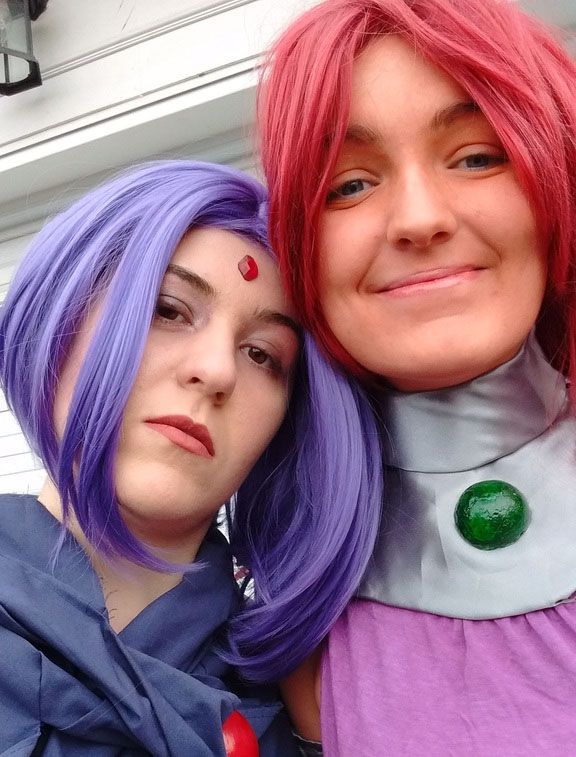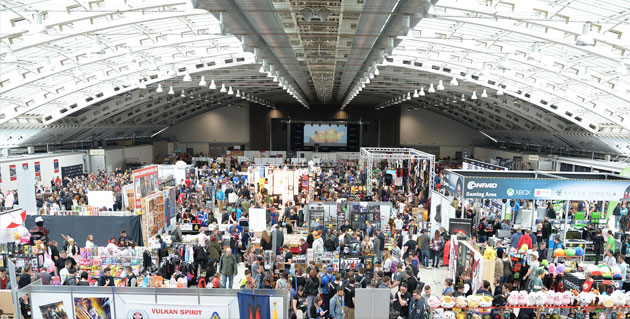- 58Shares
Guest blogger: Elaine Tamblyn-Watts is an Ottawa-based Anglo-Anishinaabe writer and editor. She was supposed to become a foreign correspondent, but she developed fibromyalgia and had to drop out of journalism school, so now she watches a lot of cartoons and gets a lot more work done. Elaine served as copy editor for The Charlatan for the 2016-17 year, put out a poetry chapbook called Fingernail Moon, and is currently working on about nineteen other projects.
My best friend is a cosplayer. Between her eye for detail, her sewing skills, her sheer resourcefulness, and her courage in the face of frequent glue-gun burns, she’s got a real knack for it – and it shows. For her, our local comic con is bigger than Christmas. She waits for it, prepares for it, works late into the night beforehand and early the morning of. Last spring, she dragged me along with her.
Psyched as I was for us to hang out together, especially in full Teen Titans cosplay, I didn’t handle it super well. The lack of sleep barely fazed her, but it had me looking more like a Walking Dead extra than a 2005-era Cartoon Network Raven. I stumbled through the convention center parking lot with very little grasp of what I was getting into. After five minutes in the main con area, I nope’d back out again to hunt down some coffee and silence. By the end of the day, I was miserable and exhausted, and I figured conventions weren’t for me.
This was six months prior to my fibromyalgia diagnosis, so I didn’t realize yet how much sense it made that I didn’t do well dropping my sleep-deprived self into a loud, crowded, and unfamiliar environment for hours at a time, even though the debilitating pain part hadn’t caught up to me yet.
Since getting the label slapped on me, though, I’ve realized it’s still possible to enjoy cons, festivals, and other giant, geeky events while chronically ill—it just takes a bit of planning to make it work. Having had an active 2017 despite my shiny new disability, I’ve figured out some best practices for low-spoons convention attendance that have helped me make the most of events.
Prioritize your activities.

When I look at the schedule of talks and tables and appearances for a con I’m interested in, my immediate response is almost always to attend all the things. Then, inevitably, one of the talks will overlap with one of the meet-and-greets, or one of the exhibitions is way in another building from the panel right before it. That’s when I realize I’m going to have to make some actual choices.
This is twice as important when you’re chronically ill—there are scheduling conflicts, sure, but some of them are with your own future suffering. While planning your convention adventures from the safety of your couch may make you feel like anything is possible, deep down you know that you’ll inevitably be too tired, too nauseated, or in too much pain for some of the stuff on your list—and if you manage to fit everything in on day one, you might not make it to anything at all on day two.
But that’s okay! Accepting that you might not make it to everything is the first step to enjoying yourself. So, open the big con schedule and choose your absolute must-see activities: the signing with the artist who flew here from around the world and probably won’t be back for ten years, the workshop demoing the materials you’ll never be able to afford on your own, the panel discussion with All Your Faves—whatever that means for you. Figure out where and when those events are, and reassure yourself that, even if you spend the rest of the con passed out in your hotel room or recovering in a nearby Starbucks, as long as you hit those events, you’ll have had a truly wicked time.
Even if all you want to do is cruise through the artist alley, check out some props on display and mingle amongst the fans, it’s still smart to have at least a sketchy vision of how you want your day to go.
Know what to expect.
Is all the action going down in one big, open room, or is the footprint a lot bigger? My local comic con was held in the big convention center out by the airport, as a lot of them are; but when I went to TCAF this spring, things were different. Their main venue was spread out over three floors, with events and signings in the main building, the hotel next door, a campus building nearby, and a whole array of local bars, and I was overwhelmed pretty quickly.
Learn from my mistakes: figure out where the elevators are in advance for every building you’re planning to be in. Especially check if there are extra, out-of-the-way elevators you won’t have to wait forever for. Same goes for bathrooms—and it doesn’t hurt to pinpoint a few potential quiet spots near your key locations either, whether or not sensory overload is an official part of your condition.
If you can’t find any accessibility info online for a venue, it’s worth emailing them or giving them a call; it’s definitely annoying, but it beats the hell out of rolling up to the address the day of and realizing it’s up a big ol’ flight of stairs. Don’t get caught off-guard by inaccessible venues; they always suck, but they suck even more when they’re a surprise.
Treat yourself (really, really well!)
As a fibromyalgia patient, my biggest challenge is pacing myself. While there are a lot of things I still can do—walking, going up stairs, travelling to unfamiliar places, running on little sleep—I pay dearly afterward in pain and fatigue. Sometimes it’s immediate, sometimes it’s hours later, but I always pay the price for pushing myself too hard. I know that intellectually, but it’s hard sometimes to accept it instead of trying to do everything I feel like I “should” do anyway.

These are spoon theory basics, but it’s important to remind yourself that if you’re at this con to have a good time, you don’t need to prove anything to anyone while you do it. Now’s not the time to try to tough out all the myriad inconveniences of your illness—it’s the time to plan for them! If you’re not great at acknowledging your own needs, it might help to imagine you’re packing a convention kit for somebody else, to somebody you want to give the best time ever.
If you know spending hours on end in a bright, loud, crowded space will be hard on you, bring sunglasses, earplugs or headphones, and give yourself full permission to duck out of there for a breather whenever you need to. If you’ve got optional meds for your milder symptoms (NSAIDs, Gravol, etc.), now’s not the time to be stingy with yourself—if they’ll help you feel better without hurting you, you deserve to take them.
Now’s also the time to be generous with yourself when it comes to mobility aids. If you use one but only when you “really need to,” bring that sucker with you. If it’ll help you stay up and about and doing cool stuff, then you really need to use it. The only caveat here is that if you bring it with you, you’re going to have it with you the whole time; make sure it’s going to fit everywhere it needs to.
Personally, I use a cane all the time, but even with it I can’t stay on my feet for long. I had big plans for my TCAF trip, though, so I went all-out and rented a mobility scooter from a local company, which was one of the greatest choices ever made by anyone. That thing let me cruise around through the booths for hours on end, and it was great for carrying my bag, too. It was perfect for getting from venue to venue, and knowing I wouldn’t be stranded if I ran out of energy cut down the anxiety factor for me. I’d be lying if I said I didn’t crash into a few doorways here and there, but it was totally worth it.
It definitely cost me some money, but that’s the moral of the story here: make your enjoyment of the con—your actual enjoyment, based on your actual needs—your top priority. Whatever budget you’re working with, don’t be afraid to allocate a serious slice of it toward things that keep the con bearable for you. That might mean springing for a taxi instead of public transit, buying the fancy VIP-level tickets to skip lineups, renting some mobility equipment, or even just treating yourself to the pricey food on-site instead of using up the spoons to pack a lunch or go elsewhere.
These three lessons made all the difference for me, and I’ve managed to brave all kinds of fairs, festivals, and concerts since then using the same principles. If you remember to treat your experience as a priority, I hope you’ll be able to get more out of big events on low spoons, too. Don’t be afraid to put yourself first—and if you need me, I’ll be researching cosplays that’ll work well with a motor scooter.
Read more like this: LARPing While Disabled


Why couldn’t I have found this five years ago when I started getting into cons and then decided my only option was to nearly kill myself if I wanted to enjoy it?? This seriously felt like you were taking the words directly from my brain. Every single thing here is so true and so accurate and so helpful. I wish I could’ve known this earlier, and I’m so glad tips like this are available for people just getting started now!!